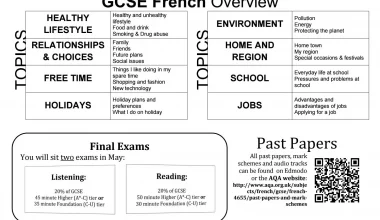How many English GCSE papers are there? There are 2 papers; creative writing and fiction. GCSE plays an important role in the student’s education, especially in the United Kingdom.
These exams are designed to assess a student’s knowledge and skills across various subjects, ranging from mathematics to science, history to languages.
Among the many subjects offered, English stands out as a cornerstone of education, fostering critical thinking, communication, and literacy skills that are essential for academic and professional success.
However, a question that often arises is: How many GCSEs is English worth? As we explore the multifaceted aspects of English GCSEs, we will gain insight into why these qualifications hold such a prominent position in the educational landscape of the UK.
Table of Contents
- English as a Core Subject
- Do You Need English GCSE?
- What are the GCSE English Language Papers Like?
- What Exam Board is GCSE English?
- How Many GCSE English Papers Are There?
- How Many GCSEs is English Worth?
- How Many GCSE Papers are there for Maths
- How Many Science GCSE Papers are There
- How Many GCSE Papers are There for Geography
- FAQs
- Conclusion
- References
- Recommendations
English as a Core Subject
English, in its various forms, is an indispensable component of a well-rounded education. It encompasses literature, language, and communication skills, making it a subject that goes beyond mere classroom learning.
It is not only about reading Shakespearean plays or mastering grammar rules; they empower students to think critically, express themselves effectively, and engage with the world around them.
- Academic Foundation: English GCSEs provide a solid academic foundation by honing reading comprehension, analytical thinking, and writing skills. These skills are transferable across various subjects, enabling students to excel in their studies.
- Communication Skills: Effective communication is vital in any profession. English GCSEs equip students with the ability to articulate ideas clearly and persuasively, whether in written or spoken form. This skill is invaluable in all walks of life, from job interviews to public speaking engagements.
- Cultural Awareness: Studying literature exposes students to different cultures, historical contexts, and diverse perspectives. It fosters empathy and cultural awareness, promoting a well-rounded worldview.
- Employability: Employers value candidates who possess strong written and verbal communication skills. English GCSEs can significantly enhance one’s employability, as they demonstrate proficiency in these crucial areas.
Do You Need English GCSE?
Whether you need English GCSE qualifications depends on your specific goals, career aspirations, and educational pathway. Here are some considerations to help you determine if you need English GCSEs:
Educational Requirements
- Further Education: If you plan to pursue further education, such as A-levels or university degrees in the UK, many institutions require a minimum grade in English GCSE as an entry requirement. These requirements can vary, so it’s essential to research the specific institutions and programs you’re interested in.
- Apprenticeships and Vocational Training: Some vocational courses and apprenticeship programs may have English GCSE requirements. The exact requirements will depend on the program and provider.
Read: How Much Does It Cost To Go To University In The UK | 2024 Expert Tips?
Career Goals
- Employability: Proficiency in English is highly valued by employers, as effective communication is a critical skill in many professions. If your career goals involve jobs that require strong written and verbal communication, English GCSEs can enhance your employability.
- Specific Careers: Certain careers, such as teaching or journalism, often have specific English GCSE requirements due to the nature of the work. It’s essential to research the prerequisites for your desired career path.
Global Communication
- International Opportunities: If you plan to work or study in an international context, English proficiency is often a significant advantage. English GCSEs can help you communicate effectively in global settings.
Personal Development
- Literacy and Communication: English GCSEs provide a solid foundation in literacy and communication skills that are valuable in everyday life. They enhance your ability to understand and express ideas, both in writing and verbally.
Cultural Awareness
- Cultural Enrichment: Studying English literature and language can broaden your cultural awareness and expose you to diverse perspectives and ideas, which can be enriching on a personal level.
What are the GCSE English Language Papers Like?
The GCSE English Language examination in the United Kingdom typically consists of two papers: Paper 1 and Paper 2. These papers assess a student’s reading and writing skills and are a key component of the English GCSE qualification.
Here’s an overview of what you can expect from each paper:
GCSE English Language Paper 1: Explorations in Creative Reading and Writing
This paper assesses your reading and writing skills, with a focus on creativity and comprehension. It is divided into two sections:
Section A: Reading (50% of the total marks)
- Duration: 1 hour
- You will be given a source text, which could be an extract from a novel, short story, or non-fiction piece.
- You will need to read and respond to the source text, answering questions that test your comprehension, analysis, and interpretation of the text.
- Questions may ask you to identify key ideas, analyze language techniques used by the author, and evaluate the writer’s intentions and perspectives.
Section B: Writing (50% of the total marks)
- Duration: 1 hour
- You will be presented with a choice of writing tasks, often including narrative and descriptive writing.
- You need to select one task and write a creative piece, such as a story, description, or imaginative response.
- Your writing will be assessed for creativity, accuracy of language, and effective use of literary and stylistic techniques.
GCSE English Language Paper 2: Writers’ Viewpoints and Perspectives
This paper focuses on non-fiction texts, including persuasive writing, argumentative essays, and speeches. It assesses your ability to analyze and produce non-fiction writing.
Like Paper 1, Paper 2 is also divided into two sections:
Section A: Reading (50% of the total marks)
- Duration: 1 hour and 15 minutes
- You will be given two non-fiction source texts with contrasting viewpoints on a specific topic or issue.
- You need to read and respond to these texts, demonstrating your ability to identify key points, compare and contrast perspectives, and evaluate the effectiveness of language and argumentation.
Section B: Writing (50% of the total marks)
- Duration: 45 minutes
- You will be presented with a choice of writing tasks that require you to produce a non-fiction piece, such as a letter, article, speech, or persuasive essay.
- You need to select one task and write a coherent, structured response that effectively communicates your viewpoint on a given topic. You should use persuasive techniques and provide supporting evidence.
What Exam Board is GCSE English?
The General Certificate of Secondary Education (GCSE) in English is offered by several different exam boards in the United Kingdom. The choice of exam board can vary depending on the school or educational institution where the student is studying.
Some of the prominent exam boards for GCSE English include:
- AQA (Assessment and Qualifications Alliance): AQA is one of the largest and most well-known exam boards in the UK. They offer a range of GCSE qualifications, including GCSE English Language and GCSE English Literature.
- Edexcel (Pearson Edexcel): Edexcel is another major exam board that provides GCSE qualifications, including GCSE English Language and GCSE English Literature.
- OCR (Oxford, Cambridge, and RSA Examinations): OCR is known for its GCSE English qualifications, which cover both the English Language and English Literature.
- WJEC (Welsh Joint Education Committee): WJEC is an exam board that provides GCSEs, including GCSE English, in Wales. They offer separate English Language and English Literature qualifications.
- CCEA (Council for the Curriculum, Examinations, and Assessment): CCEA is the exam board for Northern Ireland and offers GCSE English Language and GCSE English Literature as part of its qualifications.
How Many GCSE English Papers Are There?
For all UK exam boards, there are 2 English Language GCSE exam papers. However, the content and structure of the exam is dependent on your exam board.
It’s important to check with your school which exam board your center uses. Specifications for each exam board can be found on their respective websites if you want all the details on your GCSE English exams.
Even though each exam board has individual specifications, there are some similarities across all papers.
Related: Why Many Fail GCSE Exams in 2024
How Many GCSEs is English Worth?
While GCSE English qualifications are typically worth two GCSEs, their value extends far beyond the number of qualifications. They serve as a foundational pillar of education, contribute to academic and career opportunities, and provide essential life skills.
The exact number of GCSEs in English needed varies depending on individual goals and the specific requirements of educational institutions and careers.
Students should consult with their school or educational provider to ensure they meet the requirements for their chosen path.
How Many GCSE Papers are there for Maths
Three math papers: Edexcel, AQA, and OCR exams are all worth 240 marks each, while OCR exams are worth 300. You will take three math papers total—two calculator papers and one non-calculator paper—each lasting 90 minutes. The only distinction between those exams is the amount of credit available.
How Many Science GCSE Papers are There
Six test papers are needed of all GCSE Science students. Two exam papers are allocated to each of the three subjects: two papers each for biology, chemistry, and physics.
How Many GCSE Papers are There for Geography
The curriculum is divided into three papers that cover fieldwork, human geography, and physical geography, ensuring a seamless transition from GCSE to A-level.
FAQs
GCSE English qualifications are considered core subjects and are mandatory for most students in the UK. They are essential for academic progression and meeting entry requirements for further education.
It’s highly unlikely. Most A-level programs and universities require a minimum grade in GCSE English as a prerequisite for admission.
Entry requirements can vary by institution and course. It’s best to check with the specific institution or course provider for their GCSE English entry requirements.
Conclusion
The worth of GCSE English qualifications extends far beyond the mere number of certificates earned. GCSE English Language and English Literature serve as foundational pillars of education, equipping students with essential skills in communication, critical thinking, and cultural awareness.
While they are typically worth two GCSEs, their value lies in their broad applicability, opening doors to further education, career opportunities, and personal growth.
The specific number of GCSEs in English needed varies depending on individual goals and the requirements of educational institutions and careers.
References
- Thinkstudent.co.uk ______ How Many GCSEs is English Worth?
- Thinksmartacademy.co.uk _______ GCSE English Explained
- Wikipedia.com _____ GCSE
- century.tech _____ AQA GCSE English Language
Recommendations
- Are GCSEs (Actually) Hard? Top Tips for Passing the Most Difficult GCSE Exam Papers
- The 17 Best Things You Can Do on The Day of Exam | Tips
- 7 Tips for Choosing Your First Programming Language
- How To Write An EPQ Essay till Conclusion (Step-by-Step Guide)
- Last-Minute GCSE Revision Tips| Score Higher In Last Minute






